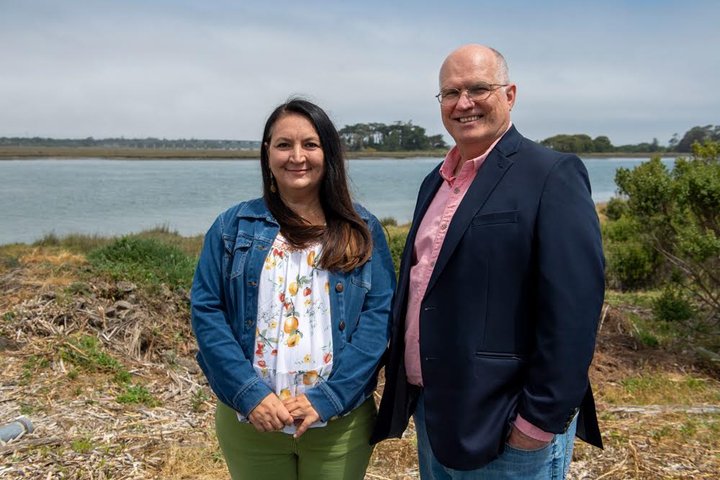
Wiyot Tribal Administrator Michelle Vassel and Cooperation Humboldt Co-founder and Executive Director David Cobb, with Tuluwat Island in the background, as they prepare to launch Dishgamu Humboldt, an ambitious land trust that is to be led by the Wiyot Tribe | Photos: Mark McKenna
Just about everywhere she looks throughout Humboldt County, Wiyot Tribal Administrator Michelle Vassel sees need. There’s a lack of well-paying jobs and rampant food insecurity. There’s a lack of skilled trades labor and affordable housing. And for the Wiyot people, who lived in approximately 20 village sites scattered around Humboldt Bay before first contact, Vassel sees a lack of autonomy over their ancestral territory.
But now, on the near horizon, Vassel also sees a solution to some of the region’s most entrenched problems: Dishgamu Humboldt. Named after the Wiyot word for love, Dishgamu Humboldt is a first-of-its kind community land trust, a partnership between the tribe and Cooperation Humboldt that those involved feel will have a transformational impact on the area.
“I think what excites me most is just working on the concept of place-based healing, and looking at building together as a community and coming together as a community and working on the long-term vision for the place that we all live,” Vassel said, stressing that the project is truly about taking immediate action toward a long-term vision. “We’re looking at multi-generational. We’re looking past 10, 20, 30 years. We’re looking at 100 years, 200 years, 250 years.”
###
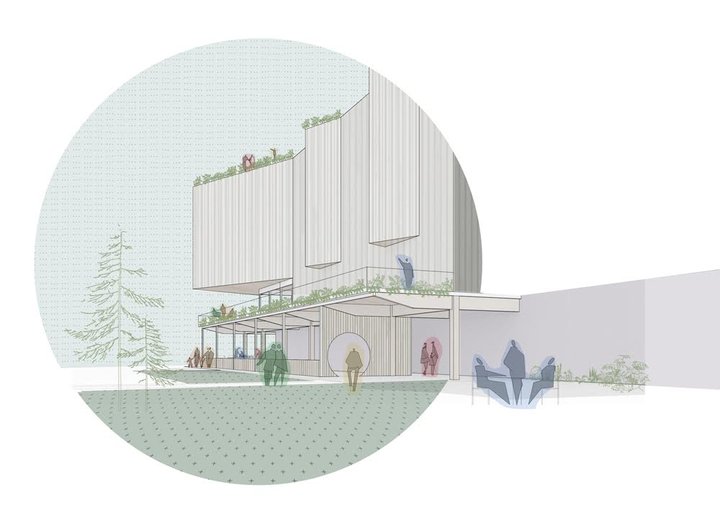
An artist’s rendering of the Wiyot-led land trust’s plans for a proposed apartment complex in Eureka. Courtesy of Dishgamu Humboldt
If you get Cooperation Humboldt co-founder David Cobb to tell you Dishgamu Humboldt’s origin story — not the elevator pitch but the cocktail party version — an undeniable irony comes into sharp focus. Long before Cobb and Vassel hatched plans for the Wiyot-led land trust that aims to address pressing needs while putting land back under Wiyot ownership throughout the tribe’s ancestral territory, there was a wealthy white man.
It was the summer of 2017 when Robin Arkley — whom Cobb describes as “Humboldt’s own Mr. Potter” — took to the radio waves to lambast the city of Eureka’s plans to return 200 acres of Tuluwat Island back to the Wiyot Tribe from whom it had been violently stolen 150 years prior.
“We’re giving it away! To the Natives!” Arkley said incredulously, protesting that he and his kids liked using the island and shouldn’t be prevented from doing so simply to right a multi-generational wrong that began with the slaughter of more than 100 unarmed people, mostly women, children and elders.
The businessman’s effort to keep the island from being returned to the Wiyot Tribe ultimately failed, with the city showing no interest in his offer to pay more than twice the appraised value of the island and the city council remaining resolved that Tuluwat should be returned to the people who hold it sacred. But seeds were planted that day that are just now beginning to bear fruit.
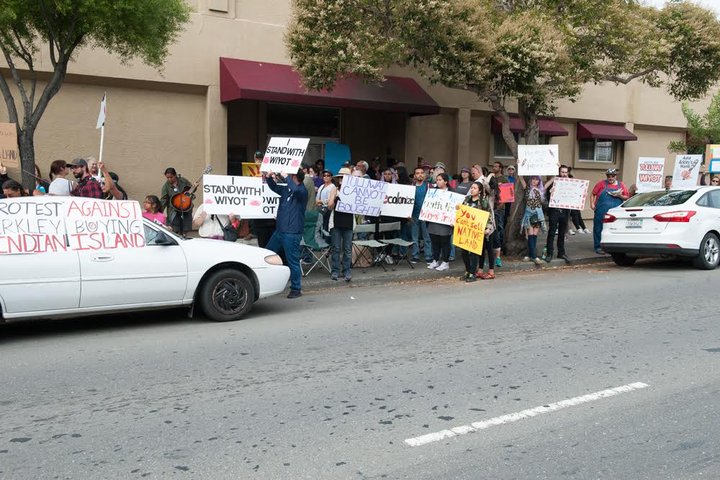
More than 150 people protest in front of Robin Arkley’s Eureka office after the wealthy businessman said on a local radio show he intended to block the return of Tuluwat Island to the Wiyot Tribe by purchasing the property in 2017.
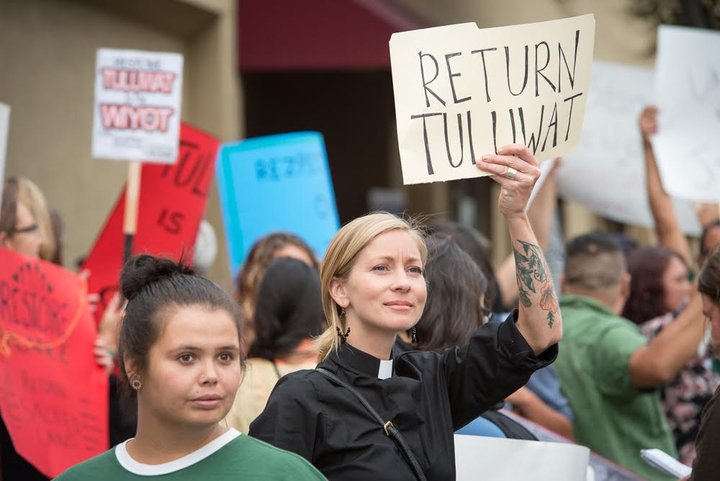
Bethany Cseh holds a sign calling for the return of Tuluwat Island to the Wiyot Tribe during the 2017 protest.
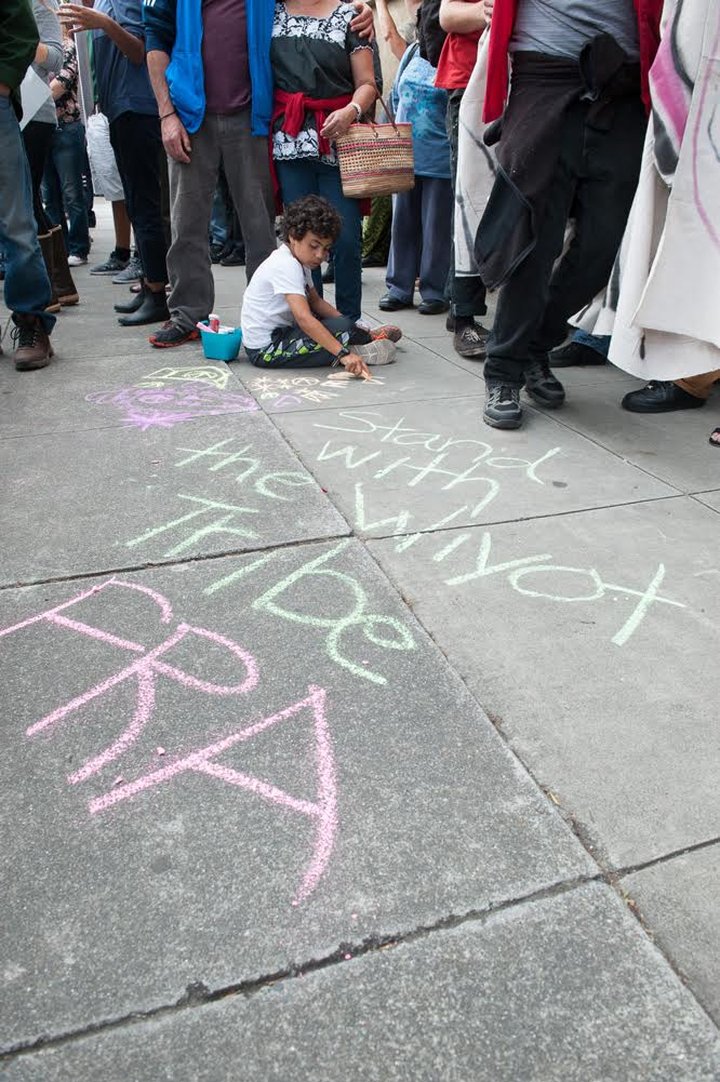
Carlo Campagna, 8, of Eureka, draws with chalk during a 2017 protest in front of Robin Arkley’s Security National Servicing Corp.
When some 150 people turned out to protest in front of Arkley’s Eureka office in the weeks following his comments on the radio, Cobb and Vassel met for the first time and a connection was born, one that has since led to a deep friendship. And Cobb said the gravity of the moment struck him — with the city of Eureka taking the monumental and unprecedented step of giving back tribal lands — and stuck with him, noting that, years later, he still has the “I Stand with Wiyot” sign he held that day.
At the time, Cobb was working to get Cooperation Humboldt off the ground with Tamara McFarland. The pair committed to pay 1 percent of the nonprofit’s gross income annually to the Wiyot Tribe as an honor tax. When the nonprofit was ready to begin taking on projects — tackling food sovereignty and working toward the development of a solidarity economy — Cobb and McFarland went to the tribe to ask for its input.
“I am an uninvited guest on un-ceded Wiyot territory,” he says. “The best thing I can do is heed the teachings of my mama and my poppa: ‘If you’re going to be a guest, be an appropriate guest. Act right.’ Well, I’m learning to act appropriately under the guidance of the Wiyot and my aspiration is to become a welcomed guest.”
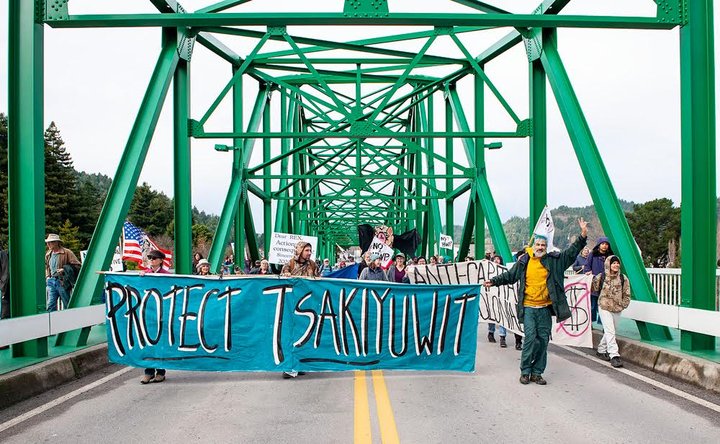
In December of 2019, the nonprofit Cooperation Humboldt helped the Wiyot Tribe organize protests against Terra-Gen’s plans to erect a large wind farm on Bear River Ridge, an ancestral prayer site known to the Wiyot people as Tsakiyuwit, cementing a working relationship between the tribe and the nonprofit
If the seed of a lasting partnership between Cooperation Humboldt and the Wiyot Tribe was planted when Arkley took to the radio that day in 2017, it sprouted amid a threat to another sacred site. When the county was considering permitting a large wind farm on Bear River Ridge, an ancestral prayer site known to the Wiyot as Tsakiyuwit, the nonprofit jumped to the tribe’s aid, organizing protests, letter-writing campaigns and more in an effort to elevate the tribe’s voice and make sure its concerns were heard.
“Specifically out of that project, I think we developed a real good working relationship with Cooperation Humboldt,” Vassel says. “After that, they came to our tribal council proposing some ideas of how we could work together and we’ve just been developing that as it goes.”
###
The resulting partnership that was formalized with a Feb. 10, 2020, vote of the Wiyot Tribal Council is unprecedented and — if successful — holds the promise of generational reverberating impacts.
Dishgamu Humboldt isn’t your typical land trust. First off, its bylaws were constructed to make sure delegates of the Wiyot Tribe control the land trust in perpetuity, requiring the organization’s seven-member board always be made up of four delegates from the tribe, and one each from Cooperation Humboldt and Full Spectrum Capital Partners, which is creating the Gouts Lakawoulh Hiwechk (money that makes us well, in Wiyot) Fund to finance the land trust, and a yet-to-be finalized third entity. The Humboldt Area Foundation has also been invited to a seat on the board, an offer the organization is considering.
“This is a Wiyot-led experiment and we are taking an appropriate four-to-one role,” Cobb says. “It’s an organizational commitment in perpetuity.”
Cobb and Vassel have their sights set on a variety of ambitious projects, from eco villages and cooperative home ownership to low-income housing and worker-owned cooperatives. The through line of all the ideas is that the land trust will purchase properties in Wiyot ancestral territory for the tribe, which will own the land moving forward while the land trust or other partners would own and manage the buildings.
Take for example, the idea of a housing co-op. The land trust could purchase and renovate an existing Victorian, turning it into a four-plex. The land underneath the home would be owned by the tribe, but then four families could together purchase the building itself at an affordable price, perhaps even with added financing from the land trust.
“It would put home ownership in reach for people who typically and historically couldn’t even imagine it,” Cobb says.
The same basic idea would be at play for an eco village, Cobb says, explaining that the land trust would purchase the kind of property that would normally be subdivided in an unincorporated area of the county. But instead of building four or six traditional three-bedroom, two-bathroom homes, it would be a tiny home subdivision, which could accommodate more housing units, while also creating a walkable neighborhood with communal features, like solar panels, organic gardens, fruit trees and even horticulture ponds.
“It’s high-density that feels and looks much more bucolic,” Cobb says.
Cobb pauses a moment from discussing the specifics of various project ideas to reiterate that the whole concept of Dishgamu Humboldt is that it is Wiyot-led, allowing the people who have inhabited the county since time immemorial to lead a path forward to the benefit of all.
“Land back is not just a slogan,” he says. “This is how we make it real.”
###
The first projects up for Dishgamu Humboldt are outliers, as they won’t actually involve land ownership. The city of Eureka is in the process of requesting proposals to build apartment complexes on city-owned parking lots in an effort to ease a housing shortage and compacted rental market, both of which contribute to the city having one of the highest rates of homelessness in the country. Dishgamu Humboldt plans to submit two proposals: one for elder housing and the other for family units. Plans for both are intensely focused on sustainability.
Cobb, who has been consulting with the Schatz Energy Research Center at Humboldt State University, says the plans call for the use of laminated mass timber, a cutting edge technology.
“It’s beautiful,” he says. “It sequesters carbon. It’s an amazing thing. Our proposal is going to be incredibly beautiful and it’s going to be not just greenwashed, it’s going to be deep green. … You and I and your readers will want to live there.”
Vassel adds that the land trust is committed to using not just local labor for its projects, but an apprentice labor model.
“There’s just not enough skilled labor here,” she says. “So we need to grow people with the projects to be the people who will do more projects in the area.”
Vassel says she’s been working with College of the Redwoods and local contractors, as well as organizations like Pacific Builders, the Arcata Economic Development Corporation and the Small Business Development Center, to build apprenticeship programs that will expand the impacts of all Dishgamu Humboldt’s projects.
“We’re just trying to connect all the dots, finding contractors willing to apprentice people and finding people who want to apprentice,” she says. “It’s really needed in our area. It’s not just the place to teach — College of the Redwoods provides classes, but they also need projects to work on and licensed professionals in the field to work with.”
Developing housing complexes on city-owned parking lots provides a great opportunity for the land trust, Cobb and Vassel say, as it would allow the fledgling organization to complete two large-scale projects — proving its ability to do so — without the necessary capital outlay of purchasing land.
Vassel says the land trust team has been consulting regularly with its “financial integrity team,” which includes folks like county Treasurer John Bartholomew, Redwood Region Economic Development Executive Director Gregg Foster, Redwood Coast Rural Action Director Kathy Moxon and former Humboldt Area Foundation Executive Director Peter Pennekamp, among others. But the cornerstone of Dishgamu Humboldt’s capital effort will be the Gouts Lakawoulh Hiwechk Fund.
###
Speaking to the Journal via a video conference from the Bay Area on an afternoon in June, Taj James is all smiles. For 20 years, James says he ran an organization called the Movement Strategies Center in Oakland, which worked to “bring people together to solve problems.”
But many of the organizations James worked with, it turned out, had a shared problem.
“Many of the communities we worked with realized they needed a more robust economic development strategy,” he says, adding that caused him to shift gears to start Full Spectrum Capital Partners, an organization dedicated to pairing philanthropic individuals and organizations, investors and other funders with community-based organizations doing good work.
That work ultimately led James to Cooperation Humboldt and a series of meetings on the North Coast with a variety of organizations. James says he listened excitedly as the land trust idea came together.
“A really powerful way to really uplift the whole community is to support the leadership of the Wiyot people and tribe in helping us all figure out how to take care of the land and take care of each other in a way that’s restorative and innovative,” he says. “The needs are real and the ideas are really exciting.”
And that, he adds, will appeal to investors and donors. James said the details will take shape on a project-by-project basis, but the fundamental strategy is to pair philanthropic giving, grants and tax incentives — including those available to tribal communities — with conscious investors who are willing to take their money out of Wall Street and put it to use locally. Keys to that effort, James says, will be getting local investment initially — showing the rest of the world that Humboldt believes in efforts taking place in its own backyard — and completing a kind of flagship project the organization can point to as an example of what’s possible.
“The scale of economic development that’s needed to really transform the quality of life for the majority who live there is significant,” he says. “Significant resources are required. But those resources are available.”
Cobb, for his part, says initial fundraising efforts have already proven successful and he’s fully confident that will continue, saying people are thirsty to both give to impactful restorative justice efforts like this and to invest in more just economic structures. And when the new land trust is fully up and running, Cobb says he intends to step down as executive director of Cooperation Humboldt to work under Vassel as one of Dishgamu Humboldt’s first employees.
Vassel says the whole effort has been an exercise in “creating as we go,” as there simply isn’t an existing model for a tribally led land trust organization that looks to put land back in Native hands while managing one economic revitalization project at a time to meet urgent community needs.
“There really wasn’t a setup for this kind of thing so we’ve been working on developing it,” she says. “It’s Wiyot-led and it’s land back.”
Thadeus Greenson (he/him) is the Journal’s news editor. Reach him at 442-1400, extension 321, or thad@northcoastjournal.com. Follow him on Twitter @thadeusgreenson.
The Community Voices Coalition is a project funded by Humboldt Area Foundation and Wild Rivers Community Foundation to support local journalism. This story was produced by the North Coast Journal newsroom with full editorial independence and control.
[Ed. Note: This story has been edited from its originally submitted form to omit a passing reference to Rob Arkley as a billionaire. The Outpost highly doubts it.]
CLICK TO MANAGE